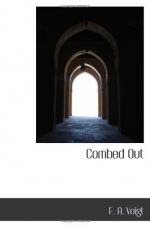I was conscious of irresistible weariness and called out with a yawn: “Good night all,” and the answer came “Good-night!” Then I heard someone singing ironically: “When you come to the end of a perfect day.” I began to feel warm and was filled with a sense of intense comfort. I could hear the water dripping on to my coat, but I had become indifferent to it. My limbs were so tired that to rest them was an exquisite luxury. And then sleep came with a sudden, overwhelming rush.
We felt refreshed and yet indolent when we heard the steps of the Police Corporal splashing through the mud at half-past five the next morning. He banged the tent and shouted: “Reveille—breakfast at six, parade at six-thirty.” We enjoyed a few minutes in bed. I ran my fingers through my hair and found that it was soaked. My pillow—a shirt stuffed with spare clothing—was wet also, but the rain was no longer beating down on the canvas. The air inside the tent was pervaded by a foul, acrid stench. I threw the flap aside and looked out. The vast expanse of steely blue was dotted with glittering stars and on the eastern horizon it merged into a faint pallor. The air was deliciously fresh. We got up one by one, yawning, groaning and grumbling, and dressed and went out to wash.
As I stood in the breakfast queue I saw that the east was shot with a delicate rose colour. The purity of the dawn seemed extraordinarily beautiful compared with the sordid dinginess of the mud and khaki that were always with us.
We paraded, but at first the parade did not seem so tedious as usual. I was in the rearmost rank, standing next to a friend, Private Cowan, and we were able to converse in whispers. He remarked that the morning was like a “symphony in blue and gold.” Even the glistening mud, usually so hideous, was flecked with luminous patches. But my feet were becoming numb and cold again. I felt that the pain they were giving me was about to deprive me of all pleasure in the rising sun to which I had been looking forward ever since reveille. I fought against it, but it was stronger than I. I became angry and trod the mud in order to get warm. I gave up the attempt and waited impatiently for the end of the parade. When the sun’s rim cut the horizon and sent a shaft of light across the land, it merely irritated me.
Three lorries arrived, our party was called out, we left the parade ground and scrambled into them. They quickly bore us to the place where we had worked the day before.
The sun was shining brightly. The long rows of stacked sleepers stretched out before us. We wondered what our work would be. Someone suggested we would have to restack the sleepers in their former places and we did not consider the suggestion absurd.
Our Sergeant had gone to get instructions. He returned and told us a mistake had been made the day before. We nearly groaned with apprehension. He leered at us and did not, for a moment, say what the mistake had been. Then he told us:




